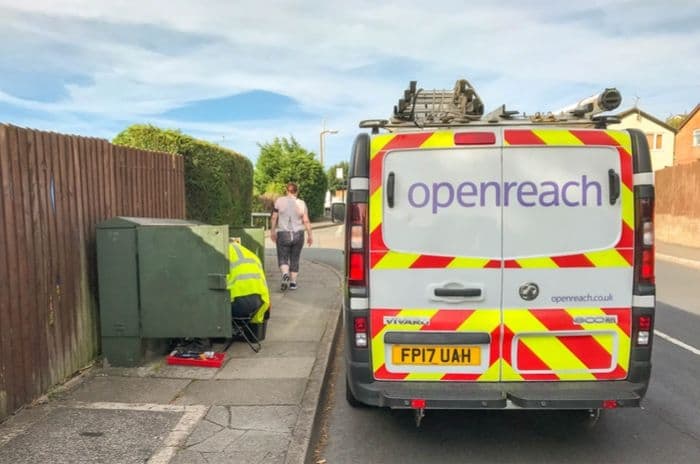Home > Broadband > News > BT 'overcharged' Sky and TalkTalk for engineering
BT 'overcharged' Sky and TalkTalk for engineering
BT could be facing a bill running into the millions of pounds after Ofcom provisionally found that the telecoms giant have been overcharging rivals for engineering and repair work.

Sky and TalkTalk have been in dispute with BT over the prices they were charged for extra engineering work to find and fix faults with their phone and broadband services during overlapping periods from 2009 to 2014.
Following a provisional decision in favour of TalkTalk last month, Ofcom have now made a similar judgement regarding Sky's complaint, saying they believe BT to have been charging more than was justified for those services.
In fact, the cases and findings are so similar that Ofcom have sided with Sky - and against BT - in agreeing to link the investigations; in future the regulator will report on them both together.
Finding fault
The dispute between Sky and BT covers the period from January 1st 2009 to June 30th 2014; the dispute raised by TalkTalk [pdf] looks at charges levied between April 1st 2011 and June 30th 2014.
Both relate to what are known as Special Fault Investigation (SFI) and Time Related Charges (TRCs).
Although they have their own equipment at the exchanges and generally run their own networks, the ISPs rely on the BT Openreach infrastructure and have service level agreements in place for a certain amount of engineering and maintenance work.
SFI and TRCs come in when the issue isn't covered by those service level agreements.
BT's rivals have long been angry about the length of time it takes Openreach, the BT division responsible for building and maintaining the network, to deal with them - as well as the number of missed and postponed appointments, and the cost of such services.
Such issues add fuel to their argument that Openreach should be completely separated from BT, with the legal separation that Ofcom have recommended being the mere starting point.
BT have fought back against such claims, saying that they've met every set of service targets they've been set by Ofcom - and they've defended how they charge for both SFI and TRCs, saying that their fees are in line with Ofcom recommendations.
How Sky were overcharged
But Ofcom have provisionally concluded that for all but the basic tests that BT's engineers must carry out when investigating faults, the charges Sky faced for each set of checks weren't based on actual costs for significant portions of the period in question.
Furthermore, Ofcom's assessment suggests that BT also failed to price their TRCs according to their actual cost for a large proportion of the period covered.
During the five and a half year period covered in the dispute with Sky, Ofcom say they believe that of the TRCs, only the initial "visit charges" for normal hours were set at a level relating to cost - but only in the period between April 1st 2011 and June 7th 2012.
When Sky brought the dispute to Ofcom, they asked the regulator to assess just how much they'd been overcharged by, and to "direct BT to pay... the sum overpaid with interest".
The good news for Sky is that Ofcom agree that they should be repaid with interest - but in a move that could lead to further dispute, they've said they don't have the information to decide how much Sky were overcharged, and that they and BT will have to settle that between themselves.
As these are provisional findings, Ofcom have given BT and Sky - and any other interested parties - two weeks to respond to them; the regulator's final decision will come some time after that.
Good news, bad news
Any sense of celebration at both Sky and TalkTalk may therefore be only temporary - and in the meantime Sky will be making their case to Ofcom regarding another investigation.
The regulator recently announced that there are "reasonable grounds for believing" that Sky have been breaking the rules regarding termination of contracts outside the cooling off period.
They opened the case last August, following complaints regarding how Sky dealt with customers who wanted to leave them between May 1st and July 31st 2015.
While Ofcom are satisfied that Sky are complying with the rules on cancellations within the cooling off period, they're less happy about how Sky deal with people who've seen out their initial contracts and want to cancel one or more services.
As we reported at the time, customers who've followed Sky's instructions to call or start a Live Chat conversation to confirm their plans to cancel have found their requests ignored, or have been told their services have been cancelled, only to find later that they're still paying for an active subscription.
Sky have been given notification of Ofcom's concerns about their cancellation and retention practises over the period in question, and now have the chance to put their case to Ofcom before a final decision is made.
Get insider tips and the latest offers in our newsletter

We are independent of all of the products and services we compare.

We order our comparison tables by price or feature and never by referral revenue.

We donate at least 5% of our profits to charity, and we aim to be climate positive.
Get insider tips and the latest offers in our newsletter





